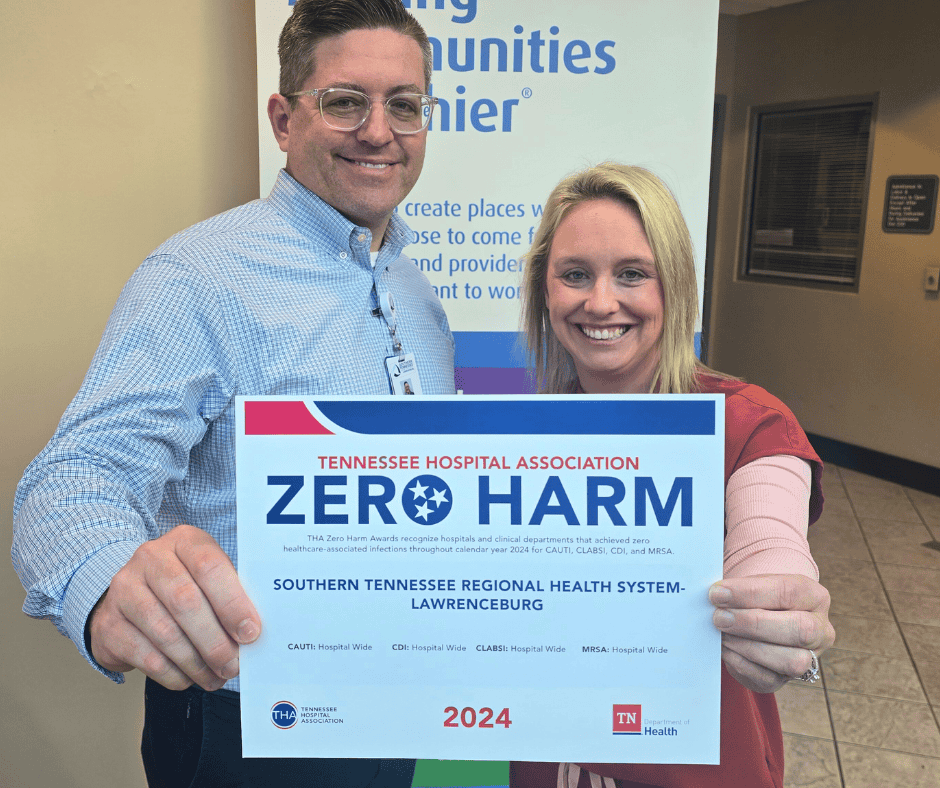News
-
.png)
Chaley Brown, FNP-C Joins Southern Tennessee Bone & Joint
January 05, 2026Southern Tennessee Regional Health System – Lawrenceburg is proud to welcome Chaley Brown, FNP-C, to the medical team at Southern Tennessee Bone and Joint.
Learn more -
.png)
STRHS-Lawrenceburg Partners with Downtown Lawrenceburg Awarded $25,000 Tennessee Arts Commission Grant For Healing Courtyard Project
December 29, 2025Downtown Lawrenceburg, in partnership with Southern Tennessee Regional Health System – Lawrenceburg, has been awarded a $25,000 grant through the Tennessee Arts Commission’s inaugural Tennessee Arts & Rural Health Initiative. The funding will support the creation of an outdoor, art-driven healing space on the hospital campus designed to improve…
Learn more -

What Your Annual Blood Work Can Reveal About Your Health
December 22, 2025Your yearly blood work gives your provider information they can’t see during a physical exam, sometimes before you notice any symptoms at all. Blood work isn’t only for sick visits – routine lab work plays a key role in preventive care and long-term health. In Lawrenceburg, Tennessee, many…
Learn more -

Michele Augustin, FNP-C Joins the Southern Tennessee Medical Group Team
December 08, 2025Southern Tennessee Regional Health System – Lawrenceburg is proud to welcome Michele Augustin, FNP-C, to the medical teams at First Choice Health – Loretto and Summertown Medical Center.
Learn more -
.jpg)
Is It a Cold, the Flu, or Something Else? How to Tell the Difference
November 25, 2025When your child starts coughing, sneezing, or running a fever, it can be hard to know what you’re dealing with. As the seasons change and kids head back to school or daycare, coughs and sniffles start making the rounds. Here in Lawrenceburg, TN, that often leaves parents asking: is it just a cold, or something more serious like the flu, RSV, or…
Learn more -

Southern Tennessee Neurology Celebrates Rebrand with Ribbon Cutting
November 19, 2025Southern Tennessee Regional Health System is proud to announce the official rebranding of Advanced Neurology Associates to Southern Tennessee Neurology.
Learn more -
.png)
Safety You Can Trust: Four Straight A’s for STRHS-Lawrenceburg
November 13, 2025Southern Tennessee Regional Health System – Lawrenceburg earned an “A” Hospital Safety Grade from The Leapfrog Group, an independent national nonprofit watchdog focused on patient safety.
Learn more -
.png)
Flu Season is Here: See how you can stay healthy!
October 27, 2025At STRHS-Lawrenceburg, our mission is Making Communities Healthier. With flu season in full swing, we’re sharing tips to help you stay healthy, prevent the spread, and recover quickly if you get sick.
Learn more -

STRHS Hosts 5th Annual Pink Party for Breast Cancer Awareness
October 27, 2025STRHS–Lawrenceburg proudly hosted its 5th Annual Pink Party on Oct. 21 at First Baptist Church Lawrenceburg, uniting over 300 guests for an evening filled with inspiration, hope, and community.
Learn more -
-(1).png)
STRHS-Lawrenceburg Announces Rebranding of Southern Tennessee Neurology
October 27, 2025Southern Tennessee Regional Health System is pleased to announce that Advanced Neurology Associates has officially rebranded as Southern Tennessee Neurology. This change reflects the practice’s continued commitment to providing advanced, compassionate neurological care to patients in southern Middle Tennessee under the trusted Southern Tennessee name.
Learn more -
.jpg)
What Does Breast Cancer Look Like in Its Early Stages?
October 21, 2025Breast cancer is one of the most common cancers in women, and early detection can dramatically improve outcomes. But what does breast cancer actually look like in its earliest stages? It’s not always a visible lump – early signs can be subtle, and knowing what to watch for can make all the difference. Below are some common early signs and symptoms to be…
Learn more -

Why You Shouldn’t Skip Your Annual Physical: Screenings That Save Lives
September 26, 2025Many people put off their annual physical, if they feel fine, there’s no urgent need to visit the doctor. But skipping your yearly check-up can mean missing the early signs of serious conditions that are often treatable if caught early. At Southern Tennessee Regional Health System - Lawrenceburg, we believe prevention is just as important as treatment.…
Learn more -

THA Awards STRHS-Lawrenceburg with Zero Harms Award for the 2nd Consecutive Year
September 16, 2025Southern Tennessee Regional Health System (STRHS) – Lawrenceburg has been recognized by the Tennessee Hospital Association (THA) in this year’s Zero Harm Awards for achieving zero healthcare-associated infections.
Learn more -

How to Protect Your Child from Fall Viruses like Flu, RSV, and COVID
September 03, 2025In warmer parts of the country like Lawrenceburg, TN, respiratory virus season can begin as early as September and stretch well into the winter. With kids back in school, viruses like flu, RSV, and COVID-19 start spreading quickly – especially among young children whose immune systems are still developing. As a parent, you can take steps now to help…
Learn more -

STRHS-Lawrenceburg Awarded Stroke Accreditation From the Joint Commission
August 04, 2025STRHS-Lawrenceburg is proud to announce its latest designation as The Joint Commission’s Gold Seal of Approval as an Acute Stroke Ready Hospital, a significant milestone in its ongoing commitment to providing high-quality, timely care to the community
Learn more -
.jpg)
Why Mosquito-Borne Illnesses Are on the Rise — and How to Protect Yourself
August 01, 2025Warmer weather and standing water are fueling a surge in mosquito-borne diseases. Here’s what you need to know and how to prevent them.
Learn more -

STRHS-Lawrenceburg Welcomes to Dr. Ramsey Ferguson to our team!
July 28, 2025STRHS-Lawrenceburg is proud to welcome Dr. Ramsey Ferguson as its newest hospitalist, caring for patients in the hospital’s Medical-Surgical (MedSurg) department. Dr. Ferguson is employed by Apogee Physicians and specializes in internal medicine.
Learn more -

STRHS-Lawrenceburg Celebrates Ribbon Cutting of the Women's Health Clinic
July 22, 2025STRHS – Lawrenceburg proudly celebrated the ribbon cutting of its new Women’s Health Clinic, now located at 1611 South Locust Avenue, Suite 200. The new space offers patients and providers more personalized care in a setting that is conveniently closer to the hospital’s Women’s Health Center.
Learn more -
-(3).png)
Robyn Scogin Named New Chief Nursing Officer of STRHS-Lawrenceburg
July 16, 2025Southern Tennessee Regional Health System-Lawrenceburg, part of Lifepoint Health, is pleased to officially announce the appointment of Robyn Scogin, MSN, BSN, RN-BC, as Chief Nursing Officer (CNO), effective immediately.
Learn more -
.png)
Good Health Starts Today – 4 Tips for Men’s Health Month
June 04, 2025Men’s life expectancy trails women’s by five years, a gap widened by lifestyle choices and healthcare habits. Men are less likely to visit doctors or seek mental health support, contributing to higher rates of heart disease and suicide. This Men’s Health Month, adopt these four steps for better health year-round:
Learn more
